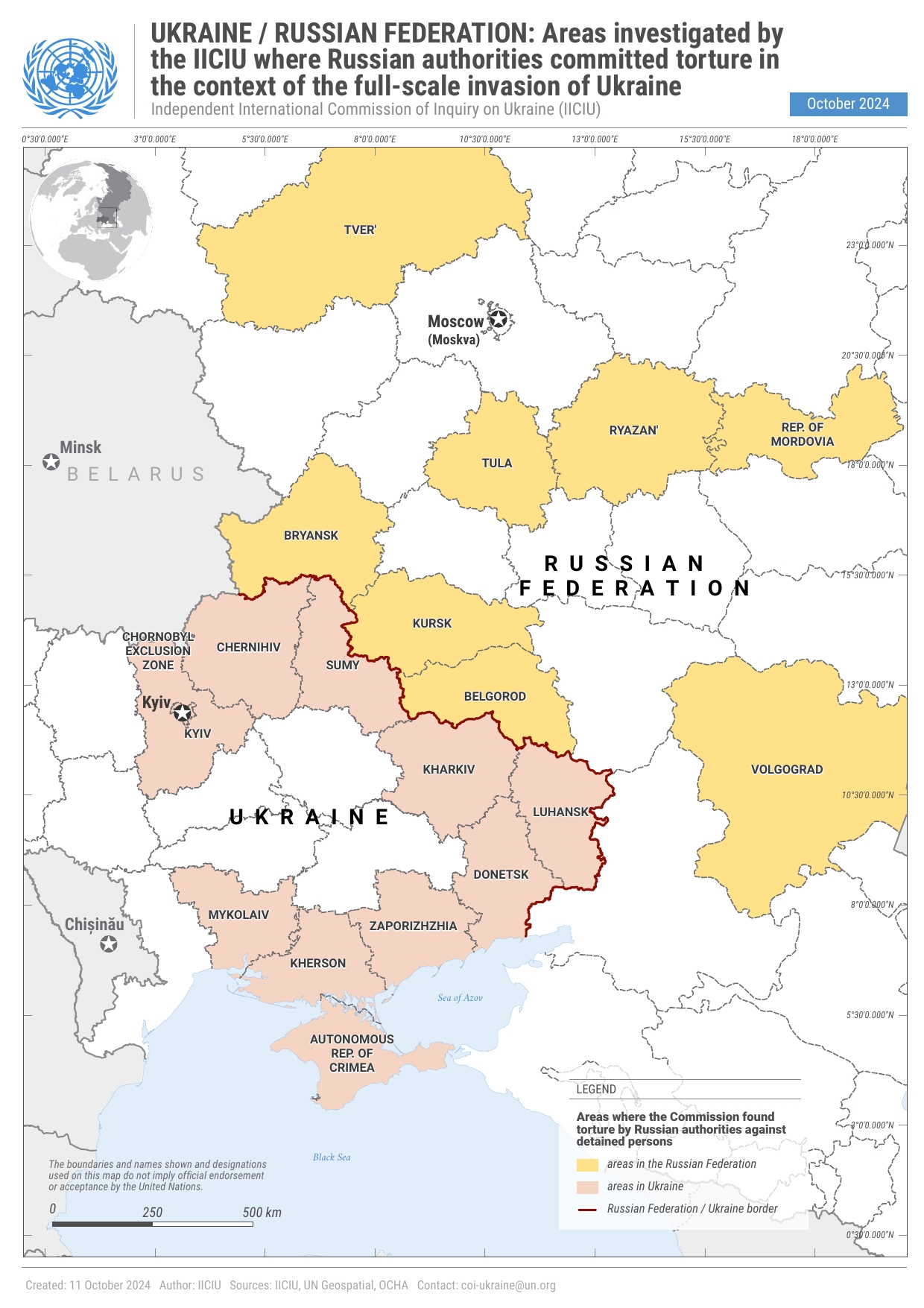Ukraine: Torture by Russian authorities amounts to crimes against humanity, says UN Commission of Inquiry – United Nations in Ukraine

Investigation Reveals Widespread Torture in Ukraine

Introduction
A recent investigation conducted by the UN Independent International Commission of Inquiry on Ukraine has revealed the widespread use of torture by Russian authorities in Ukraine. The findings of the investigation highlight the systematic nature of torture and its impact on Ukrainian civilians and prisoners of war. This report aims to provide an overview of the investigation’s key findings and emphasize the importance of addressing these human rights violations in line with the Sustainable Development Goals (SDGs).
Key Findings
- The investigation has established that the use of torture by Russian authorities in Ukraine constitutes war crimes.
- Torture was found to be widespread and systematic, targeting specific categories of individuals and serving specific aims.
- Violent practices used in Russian detention facilities were replicated in similar facilities in areas under Russian control in Ukraine.
- Specific services and security forces from the Russian Federation were deployed to perpetrate torture in Ukrainian detention facilities.
- Sexual violence, particularly against male detainees, was recurrent in detention facilities operated by Russian authorities.
- High-ranking detention facility officials were involved in the perpetration of torture, often with a sense of impunity.
Implications for Sustainable Development Goals
The findings of the investigation have significant implications for the achievement of the SDGs, particularly Goal 16: Peace, Justice, and Strong Institutions. By exposing the coordinated state policy of torturing Ukrainian civilians and prisoners of war, the investigation highlights the need for accountability and the end of impunity for perpetrators of these crimes. Ensuring justice for victims and prosecuting those responsible are crucial steps towards establishing a culture of accountability and upholding human rights.
Impact on Victims
The investigation’s report includes testimonies from victims who have suffered physical pain, trauma, and long-lasting or irreparable consequences as a result of torture. The immense psychological challenges faced by these individuals further emphasize the urgent need for justice and support for victims.
Denial of Medical Assistance
The investigation also found a general absence or denial of medical assistance to detainees who were injured, ill, or required treatment after torture. This further violates the right to health and exacerbates the suffering of victims. The denial of medical assistance also hinders the achievement of Goal 3: Good Health and Well-being.
Attacks on Infrastructure
The investigation highlighted the continuous attacks on Ukraine’s energy-related infrastructure by the Russian Federation, resulting in blackouts that affect millions of civilians. These power cuts have severe consequences on the rights to health and education, particularly for vulnerable groups such as children, older persons, and persons with disabilities. The impact on these rights aligns with Goal 3 and Goal 4: Quality Education.
Importance of Accountability
The report emphasizes the importance of judicial and non-judicial accountability in addressing these human rights violations. Identifying and prosecuting perpetrators of crimes is essential for ending the culture of impunity and providing victims with a sense of justice. This aligns with Goal 16 and the broader objective of promoting peace, justice, and strong institutions.
Conclusion
The investigation’s findings shed light on the widespread use of torture by Russian authorities in Ukraine and the urgent need for accountability. By addressing these human rights violations, the international community can contribute to the achievement of the SDGs, particularly Goal 16. It is crucial to prioritize the well-being and rights of victims and work towards a future where torture is eradicated and justice prevails.
References
- Full Report on Investigation
- Members of the Commission of Inquiry on Ukraine
- More Information on the Work of the Commission
SDGs, Targets, and Indicators
1. Which SDGs are addressed or connected to the issues highlighted in the article?
- SDG 16: Peace, Justice, and Strong Institutions
- SDG 3: Good Health and Well-being
- SDG 4: Quality Education
2. What specific targets under those SDGs can be identified based on the article’s content?
- SDG 16.1: Reduce violence and related death rates
- SDG 16.3: Promote the rule of law and ensure equal access to justice
- SDG 3.8: Achieve universal health coverage, including access to quality essential healthcare services
- SDG 4.1: Ensure that all girls and boys complete free, equitable, and quality primary and secondary education
3. Are there any indicators mentioned or implied in the article that can be used to measure progress towards the identified targets?
- Indicator for SDG 16.1: Number of deaths and missing persons attributed to conflict, terrorism, and violent acts
- Indicator for SDG 16.3: Proportion of the population who have experienced a dispute in the past two years and who sought or accessed a formal or informal dispute resolution mechanism
- Indicator for SDG 3.8: Proportion of population with access to essential healthcare services
- Indicator for SDG 4.1: Net enrollment rate in primary education
SDGs, Targets, and Indicators
| SDGs | Targets | Indicators |
|---|---|---|
| SDG 16: Peace, Justice, and Strong Institutions | 16.1: Reduce violence and related death rates | Number of deaths and missing persons attributed to conflict, terrorism, and violent acts |
| SDG 3: Good Health and Well-being | 3.8: Achieve universal health coverage, including access to quality essential healthcare services | Proportion of population with access to essential healthcare services |
| 4.1: Ensure that all girls and boys complete free, equitable, and quality primary and secondary education | Net enrollment rate in primary education |
Source: ukraine.un.org








